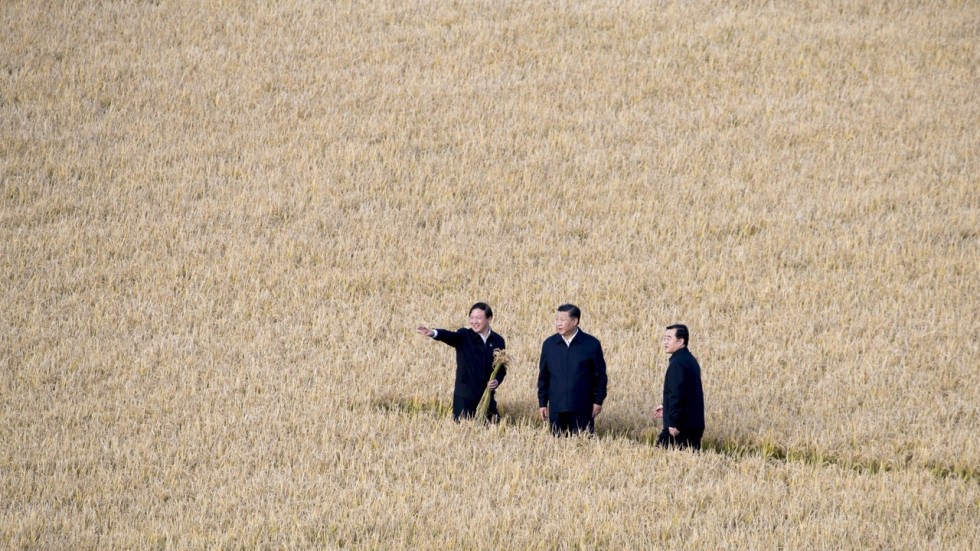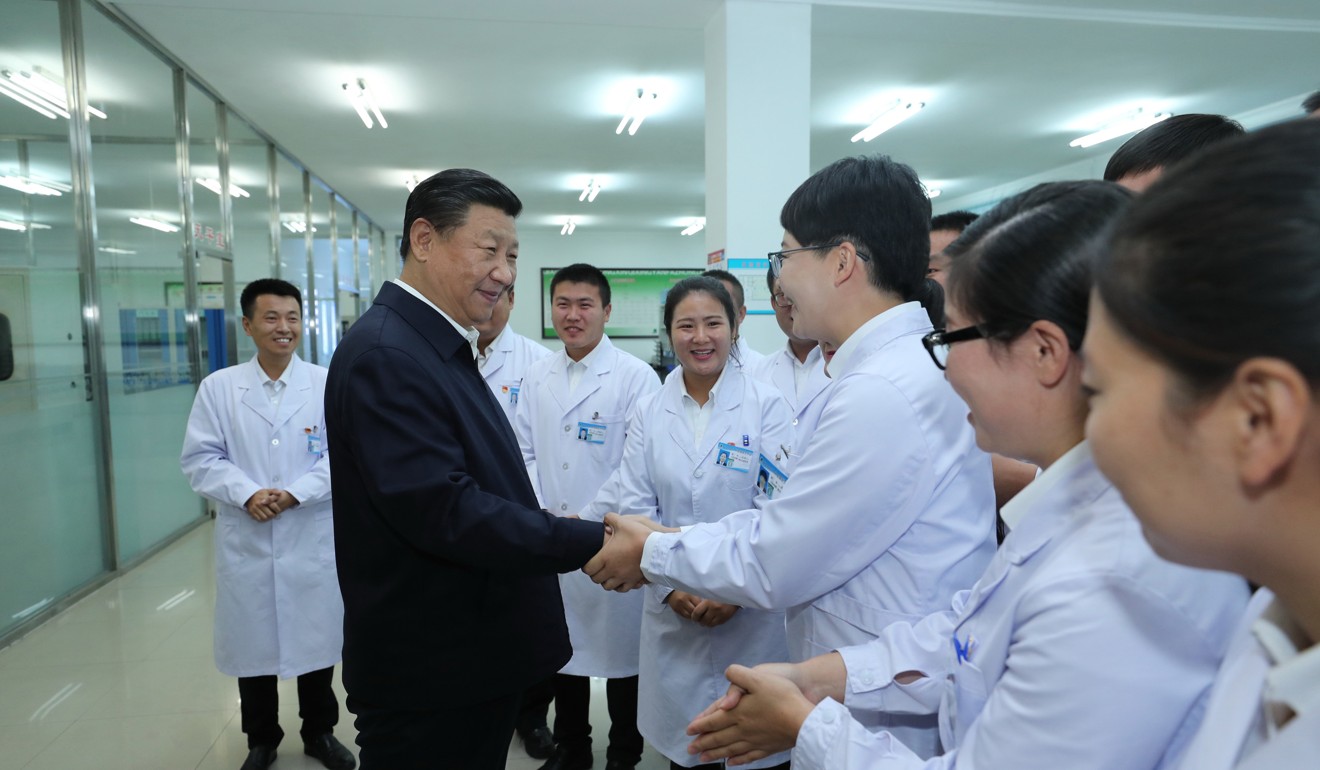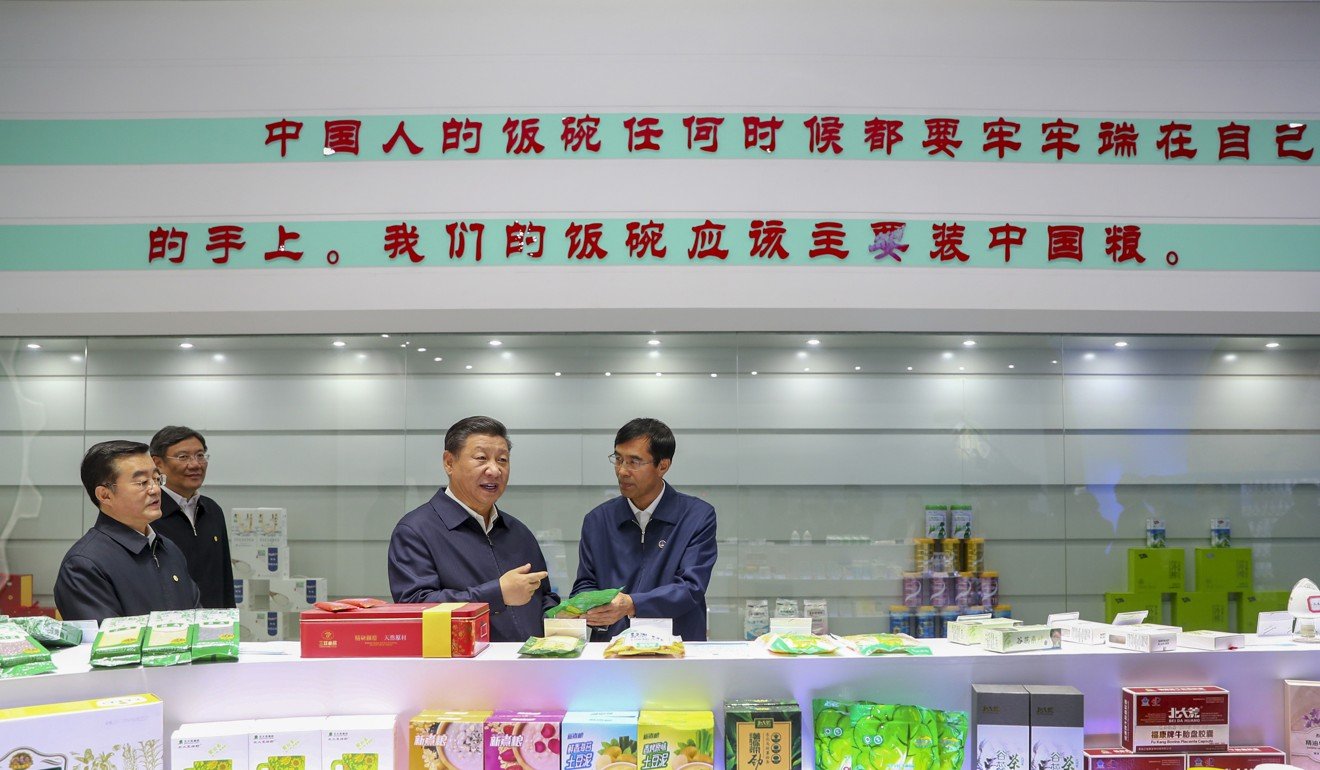Self reliance is the key word harking back to the 50's when China was embargoed by the west Xi invoke the spirit of self reliance. Yup I said blessing in disguise
Xi Jinping says trade war pushes China to rely on itself and ‘that’s not a bad thing’
Factory workers and farmers in China’s rust belt first to hear how the country will respond to rising protectionism
PUBLISHED : Wednesday, 26 September, 2018, 7:45pm
UPDATED : Wednesday, 26 September, 2018, 11:27pm
Chinese President Xi Jinping says rising “unilateralism and protectionism” is forcing China to rely more on itself for development and “it’s not a bad thing”, reflecting a determination to fight a protracted trade war with the US if necessary.
Xi, the most powerful Chinese leader in decades, said it was time for China to cut its dependence on foreign technologies and others in his first clear statement on how China would cope with the trade war.
Speaking from one of China’s biggest state-owned factories, Xi emphasised the value of self-reliance, according to
People’s Daily, the mouthpiece of the ruling Communist Party.
“Internationally, it’s becoming more and more difficult [for China] to obtain advanced technologies and key know-how. Unilateralism and trade protectionism are rising, forcing us to adopt a self-reliant approach. This is not a bad thing,” Xi said.
“Rising protectionism” is a euphemistic reference to the tariff conflict between Beijing and Washington.
“Ultimately, China depends on itself” for development, Xi said.
Xi’s comments came two days after Washington escalated the trade war by imposing tariffs on another US$200 billion of Chinese imports and China retaliated by covering US$60 billion US products with tariffs.
Trade talks originally scheduled for this week were called off as Beijing refused to talk when the US “is putting a knife to its throat”.
The Chinese government on Monday issued a lengthy white paper blaming Washington for trade bullying against China and denied US allegations that China has been using unfair trade practices or engaging in “theft” of technologies from US businesses.
Xi made the comments during a visit to China First Heavy Industries, a state-owned machinery maker in Qiqihar of the northeastern province of Heilongjiang – a factory which can trace its roots to the early 1950s, when it weathered China’s worst economic days of isolation from the rest of the world.
Ding Yifan, a senior researcher with Tsinghua University’s National Strategy Institute, said Xi’s emphasis on “self-reliance” showed that Beijing was ready to dig in its heels.
“The spirit of self-reliance is the same as the old days,” said Ding. “But the implications can be very different – if China can weather the trade war to secure a leading edge in technology and manufacturing, China will become number one and invincible.”
Xi said China was a big country which must “depend on itself for food supply, depend on itself for economic development, and depend on itself for manufacturing”.
According to pictures published by
People’s Daily, Xi addressed a group of uniformed workers and was accompanied by his aides, including vice-premier Liu He, China’s chief trade negotiator.
Xi said China “has never been so close” to its two centenary goals to make China “a moderately prosperous society” by 2021, the 100th anniversary of the Chinese Communist Party, and “a modern socialist country that is prosperous and strong” by 2049, the 100th anniversary of the People’s Republic.
As China moved closer to its national rejuvenation goal, Xi said the country had also never encountered “so many challenges and difficulties”,
People’s Daily reported.
Ding Shuang, chief China economist at Standard Chartered, said Xi's speech “sounds like a political oath to boost public confidence during the tough time of trade war” but it did not mean China would reverse its opening-up policy.
Ding said China had no choice but to rely more on itself in hi-tech fields since the doors for its acquisition of advanced technologies from others were closing.
Xi's emphasis on self-reliance did not contradict Beijing's advocacy of free trade and “China still needs to attract investment and apply its comparative advantages on exports,” Ding said.
The China First Heavy Industries visit was one leg of Xi’s tour to Heilongjiang, the province which borders Russia and is part of China’s Manchurian rust-belt. It is a cradle for China’s heavy industries and a “bread basket” for the whole country – the province accounts for half of China’s output of soybean, a key commodity for which China relies on imports to meet its domestic need.
“For farmers in Heilongjiang, they can actually gain from the trade war,” said Tsinghua University’s Ding.
“The soybean and corn farming there were hit hard by imported products, now the significance of local output is growing amid a trade war.”
Xi also toured the Qiche Group on Tuesday, a subsidiary of China’s state-owned railway car maker CRRC Group, and visited the railway freight car testing and research centre there.
Xi said equipment manufacturing was vital for the country and China must make its manufacturing capabilities stronger. In addition, Xi said the “Belt and Road Initiative” would offer opportunities for the local machinery and equipment making industry, according to
People’s Daily.
On Monday, Xi visited one of the state-owned farms in Heilongjiang and inspected rice fields, according to the official Xinhua news agency.
He flagged the importance of self-reliance there as well, saying China must ensure a firm grip of its own “rice bowl”, – and mainly rely on domestic output for its food supply.
Separately, China’ s State Council on Wednesday decided to cut import tariffs on 1,585 items from November 1.
According to a government statement, China’s average tariff level will be reduced to 7.5 per cent after the new round of cuts from 9.8 per cent on last year.
Among the cuts, the average tariff rate on electromechanical equipment imports will be reduced to 8.8 per cent from 12.2 per cent while tariffs on textiles and building materials will be cut to 8.4 per cent from 11.5 per cent.



